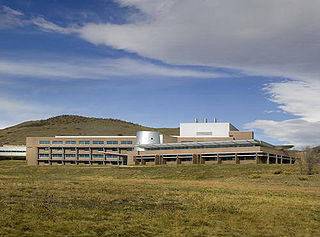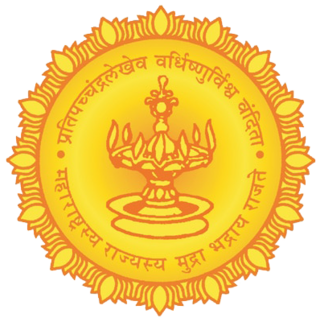
The National Renewable Energy Laboratory (NREL) in the US specializes in the research and development of renewable energy, energy efficiency, energy systems integration, and sustainable transportation. NREL is a federally funded research and development center sponsored by the Department of Energy and operated by the Alliance for Sustainable Energy, a joint venture between MRIGlobal and Battelle. Located in Golden, Colorado, NREL is home to the National Center for Photovoltaics, the National Bioenergy Center, and the National Wind Technology Center.

The National Institute of Ocean Technology (NIOT) was established in November 1993 as an autonomous society under the Ministry of Earth Sciences in India. NIOT is managed by a Governing Council and is headed by a director. The institute is based in Chennai. The major aim of starting NIOT was to develop reliable indigenous technologies to solve various engineering problems associated with harvesting of non-living and living resources in India's exclusive economic zone, which is about two-thirds of the land area of India.

The Central Arid Zone Research Institute (CAZRI) is one of the biggest research institutes of the Indian Council of Agricultural Research (ICAR), an autonomous organization working under the aegis of the Department of Agriculture Research and Education (DARE) of the Ministry of Agriculture and Farmers Welfare of Government of India. CAZRI has the distinction of being one of the first institutes in the world exclusively devoted to arid zone research and development. The institute made a humble beginning in 1952 when Government of India initiated Desert Afforestation Research Station at Jodhpur to carry out research on sand dune stabilization and for establishment of shelter belt plantations to arrest wind erosion. It was reorganized as Desert Afforestation and Soil Conservation Station in 1957 and finally in its present form Central Arid Zone Research Institute in 1959 on recommendation of the UNESCO expert, Prof. C.S. Christian of the Commonwealth Scientific and Industrial Research Organisation (CSIRO), Australia. In 1966, the institute was brought under the administrative control of Indian Council of Agricultural Research (ICAR), New Delhi.

Wind power generation capacity in India has significantly increased in recent years. As of 31 December 2022, the total installed wind power capacity was 41.93 gigawatts (GW), the fourth largest installed wind power capacity in the world. Wind power capacity is mainly spread across the southern, western, and northwestern states.

The Ministry of New and Renewable Energy (MNRE) is a ministry of the Government of India, headed by current Union Cabinet Minister Raj Kumar Singh, that is mainly responsible for research and development, intellectual property protection, and international cooperation, promotion, and coordination in renewable energy sources such as wind power, small hydro, biogas, and solar power.

SolarPACES is an international cooperative network bringing together teams of national experts from around the world to focus on the development and marketing of Concentrating Solar Power (CSP) systems.

Solar power is a fast developing industry in India. The country's solar installed capacity was 63.303 GWAC as of 31 December 2022. Solar power generation in India ranks fourth globally in 2021.

According to preliminary data from the US Energy Information Administration, renewable energy accounted for about 12.6% of total primary energy consumption and about 19.8% of the domestically produced electricity in the United States in 2020.
Central Power Research Institute (CPRI) is a research institute originally established by the Government of India in 1960, with headquarters in Bangalore. The Institute was re-organized into an Autonomous Society in the year 1978 under the aegis of the Ministry of Power, Government of India. The main objective of setting up the Institute is to serve as a national Level laboratory for undertaking applied research in electrical power engineering besides functioning as an independent national testing and certification authority for electrical equipment and components to ensure reliability in power systems and to innovate and develop new products.

The Energy and Resources Institute (TERI) is a research institute in New Delhi that specializes in the fields of energy, environment and sustainable development. Established in 1974, it was formerly known as the Tata Energy Research Institute. As the scope of its activities widened, it was renamed The Energy and Resources Institute in 2003.
The Central Public Works Department, commonly referred to as the CPWD, is a premier Central Government authority in charge of public sector works. The Central Public Works Department, under the Ministry of Urban Development now MoHUA, deals with buildings, roads, bridges, flyovers and other complicated structures including stadiums, auditoriums, laboratories, bunkers, border fencing and border roads. The CPWD came into existence in July 1854 when Lord Dalhousie established a central agency for execution of public works and set up Ajmer Provincial Division. It has now grown into a comprehensive construction management department, which provides services from project conception to completion, and maintenance management.

India is world's 3rd largest consumer of electricity and world's 3rd largest renewable energy producer with 40% of energy capacity installed in the year 2022 coming from renewable sources. Ernst & Young's (EY) 2021 Renewable Energy Country Attractiveness Index (RECAI) ranked India 3rd behind USA and China. In November 2021, India had a renewable energy capacity of 150 GW consisting of solar, wind, small hydro power, bio-mass, large hydro, and nuclear. India has committed for a goal of 500 GW renewable energy capacity by 2030.
The National Solar Mission is an initiative of the Government of India and State Governments to promote solar power. The mission is one of the several policies of the National Action Plan on Climate Change. The program was inaugurated as the Jawaharlal Nehru National Solar Mission by former Prime Minister Manmohan Singh on 11 January 2010 with a target of 20 GW by 2022. This was later increased to 100 GW by Prime Minister Narendra Modi in the 2015 Union budget of India. India increased its utility solar power generation capacity by nearly 5 times from 2,650 MW on 26 May 2014 to 12,288.83 MW on 31 March 2017. The country added 9,362.65 MW in 2017–18, the highest of any year. The original target of 20 GW was surpassed in 2018, four years ahead of the 2022 deadline.

Mahindra Susten Pvt. Ltd., formerly Mahindra EPC Services Pvt. Ltd. , is part of the USD 19 billion Mahindra Group. They are a portfolio company under the Cleantech arm of Mahindra Partners.
The Agency for New and renewable Energy Research & Technology (ANERT) is a government agency in the Kerala, India. Its mission is gathering and disseminating knowledge about renewable energy, energy conservation, and rural technology. The agency was established in 1986 with its headquarters at Thiruvananthapuram.
"Mr.Deepak Gupta" is a former chairman of the Union Public Service Commission.

Ministry of Energy, New and Renewable Energy Maharashtra or MAHAURJA is a ministry of Government of Maharashtra. The Ministry is currently headed by Devendra Fadnavis, a Deputy Chief Minister of Maharashtra and Cabinet Minister.
Maharashtra Energy Development Agency - MEDA is a Maharashtra government institute run with the Federal Government of India, to regulate energy conservation and to promote the development of renewable energy in Maharashtra State, including solar energy, bio-energy and wind energy. MEDA is working as a State Nodal Agency (SNA) under the aegis of Energy Department, the State of Maharashtra. MEDA is also working as a State Designated Agency (SDA) for implementation of Bureau of Energy Efficiency (BEE),
National Action Plan for Climate Change (NAPCC) is a Government of India's programme launched in 2008 to mitigate and adapt to the adverse impact of climate change. The action plan was launched in 2008 with 8 sub-missions. The plan aims at fulfilling India's developmental objectives with focus on reducing emission intensity of its economy. The plan will rely on the support from the developed countries with the prime focus of keeping its carbon emissions below the developed economies at any point of time. The 8 missions under NAPCC are as follows:
Indian Renewable Energy Development Agency Limited (IREDA) is formed in 1987 as a statutory and autonomous organisation under Government of India and administratively controlled by the Ministry of New and Renewable Energy (MNRE). The organisation is formed for promoting, developing and extending financial assistance for setting up projects relating to new and renewable sources of energy and energy efficiency/conservation.












